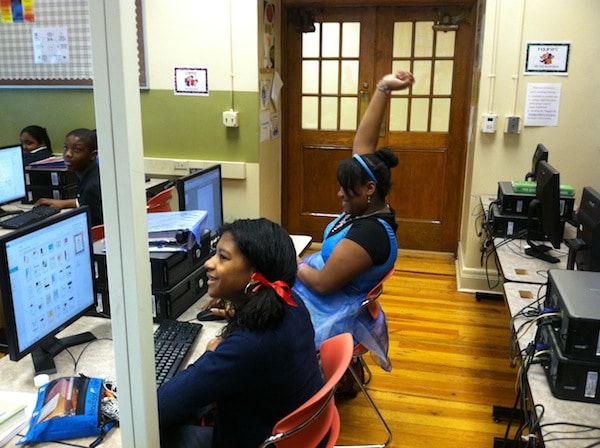Fights between board members. State intervention. Ethics charges. Staff cuts. School closings. Lawsuits. Accreditation probation. The Birmingham school system certainly has been newsworthy these last few years. But what often gets lost is, all that does not a school district make. Matter of fact, upper-level management is the point of a pyramid; the base is bigger, and arguably more important. And here’s how at least one member of the base feels about what’s being delivered in Birmingham Schools:
“I’m improving my technology skills and my typing skills. It helps us advance ourselves and prepare ourselves for the future. And the teachers do try to
work hard to prepare us for high school and college and life itself.”
So says Jamir Brown, a seventh-grader taking a technology class at Phillips Academy. He’s working on his assignment, a start-to-finish ad campaign for a toy. He’s just starting to brainstorm some print flyers. I ask him if he’s nervous about the assignment. Not even close.
“I’m confident,” he says, “because we do things like this all the time.”
Phillips Academy, a K-8 magnet school in downtown Birmingham, has consistently posted some of the best test scores in the state. It’s also is one of two schools in the Birmingham system teaching the rigorous International Baccalaureate curriculum. All this helps explain why technology teacher Channon Davis admits the state takeover was necessary but thinks news outlets missed a lot.
“What I saw from being here in the system is a lot of good schools that are doing great things, and that wasn’t actually always … you know … portrayed,” he says. “So we kind of got the burnt end of it.”
The Alabama Teacher of the Year agrees. Alison Grizzle is a math instructor at Birmingham City School’s Jackson-Olin High in Ensley. She says when reporters came to see her in action, students assumed something terrible had happened at their school. But she says the real story was happening every day.
“It was about the teachers in my district who persevere and continue to work and continue to show up every day, and give it their all, and are trying to
transform the lives of students,” she says. “There are some great teachers in Birmingham City Schools.”
Grizzle’s colleague Delilah Stitt teaches English and chairs the department at Jackson-Olin. She says reporters and citizens should set foot in school buildings before forming opinions:
“The system has been overshadowed in the past by negativity. However, no one came into the schools to actually see what the educators in Birmingham City Schools were doing. The teachers continued to teach because they really understood their mission and their purpose. And I’m so proud of the teachers who have stayed in this district and have remained dedicated to our children.”
Jamelle Prewitt is a deeply involved parent of two sons who’ve come up through Birmingham schools — one is still at Carver High. Prewitt rattles off a long list of academic programs that have benefitted her children, but she agrees with Stitt that the takeover indeed ‘took over’ the media and took attention away
from those programs.
“It made it seem as though everything in Birmingham City was wrong,” she says. “And everything in Birmingham City Schools system is not wrong. We have some outstanding programs, and things that are right need to be brought to the light.”
Though Birmingham parents and educators think much good was getting buried in board-related press, many admit there are more good things happening now than there were before the takeover. Even people who didn’t support the state intervention seem cautiously optimistic. There are reasons for the caution, but there are reasons for the optimism, too. We’ll look at both in Part Three.

